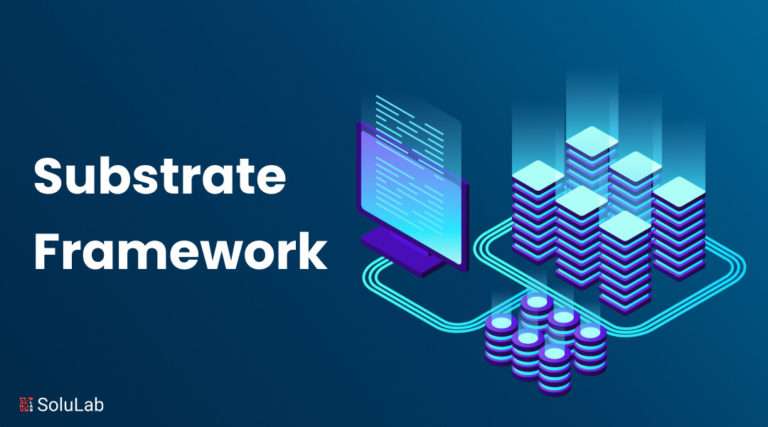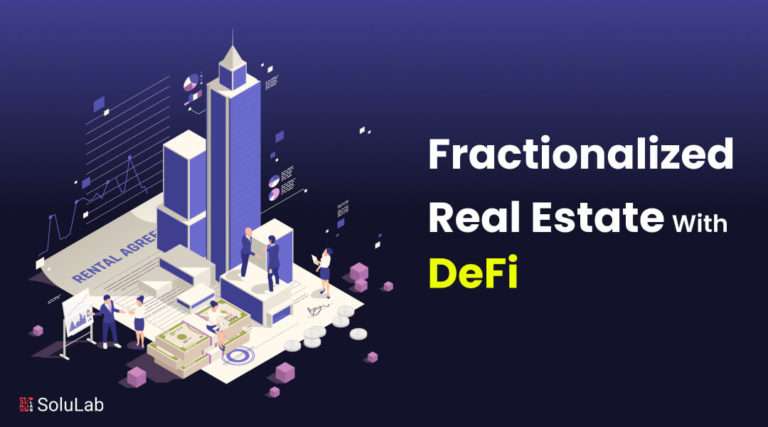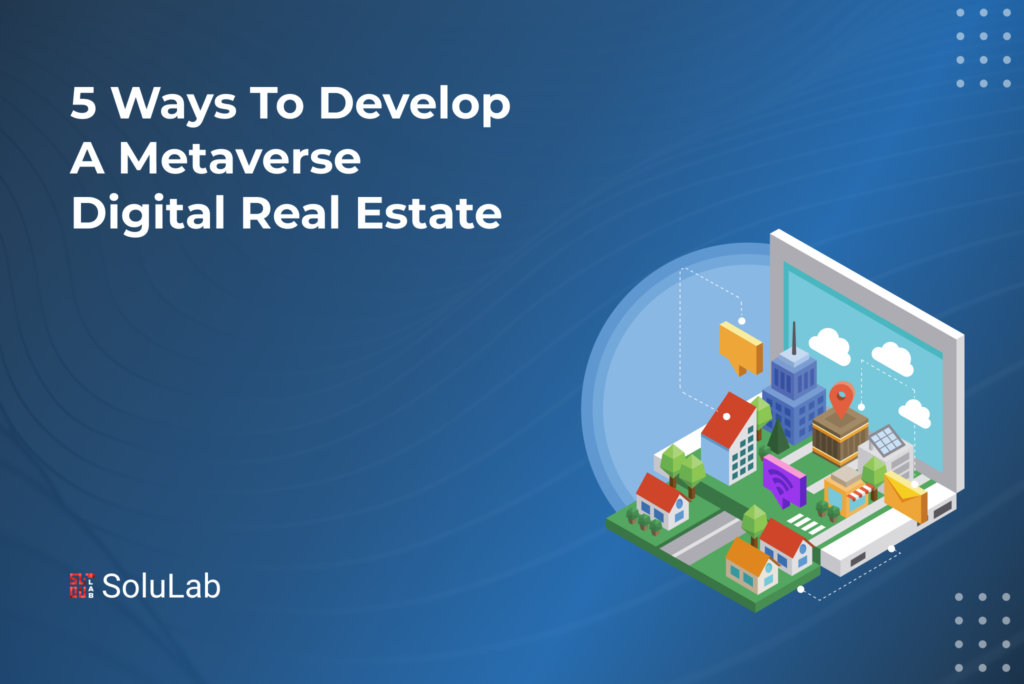
Experts predict that the metaverse will be the next stage of the internet’s development. Early speculators, professional real estate brokers, and celebrities are acquiring land that does not exist in the actual world. They’re making an investment in metaverse digital real estate, which is something that most people find confusing. As per MetaMetrics Solutions, metaverse real estate deals in the metaverse surpassed $500 million in 2021 and are likely to go even more in the following year.
Virtual real estate metaverse moguls generate their money in various methods in the physical world, including collecting rent, providing advertising space, and selling their buildings as their value increases. In the metaverse, the same holds true.
Why Should You Invest In Metaverse Real Estate?
Metaverse real estate provides users with a physical location to interact with others online. Individuals may use their digital land to interact and play games with friends. By charging for access or exchanging their NFTs, creators may monetize the content of their property. The utilization of virtual properties by brands may be used to market services, arrange virtual product launches, and deliver specific customer experiences.
These parcels of digital property represent a profitable investment opportunity for virtual real estate metaverse investors. Real-world properties may be built, flipped, or leased in the metaverse, just as they can in the real world. Certainly, there are a myriad of potential applications for metaverse real estate.
When it Comes to The Metaverse, What is Digital Real Estate?
Using 3D avatars, users may communicate with one another in the metaverse, and they can also employ human-computer interactions (HCI) to share information with the surrounding 3D environment.
real estate metaverse parts called parcels are found inside the virtual worlds of the Metaverse and may be purchased or sold using the currency of the Metaverse platform. For example, the cryptocurrency token MANA may acquire land on Decentraland.
Investors have spent millions of dollars to acquire land in the Metaverse. The fact that technology has altered the real estate metaverse industry is undeniable. Now, mortgage providers and lenders cater to clients who purchase digital real estate, which has important ramifications.
Investing in Metaverse Real Estate: A Guide to Getting Started
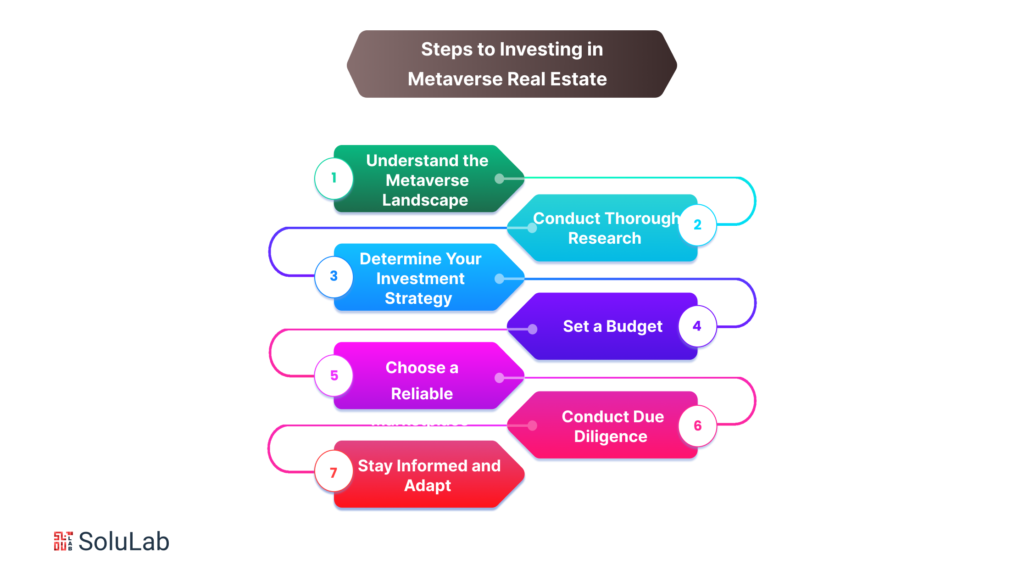
Everyone has questions like how to invest in metaverse real estate. As the metaverse concept gains popularity and digital real estate becomes a sought-after asset, many individuals are exploring the potential of investing in this emerging market. In This section, metaverse real estate is explained, If you’re considering venturing into the world of metaverse real estate investment, here are some key steps to help you get started:
-
Understand the Metaverse Landscape:
Before diving into investments, it’s crucial to have a solid understanding of the metaverse and its various platforms and virtual worlds. Familiarize yourself with popular metaverse platforms like Decentraland, CryptoVoxels, Somnium Space, and The Sandbox. Research their features, user base, and growth potential to identify the most suitable platform for your investment goals.
-
Conduct Thorough Research:
As with any investment, thorough research is essential. Explore the metaverse communities, attend virtual events, and engage with other investors to gain insights and stay updated on the latest trends. Follow reputable sources, join online forums, and network with industry experts to expand your knowledge and make informed investment decisions.
-
Determine Your Investment Strategy:
Consider your investment objectives and risk tolerance to define your investment strategy. Metaverse real estate offers various opportunities, from buying and selling virtual land parcels to developing virtual properties or leasing them to other users. Decide whether you want to focus on short-term trading, long-term holding, or actively participating in virtual real estate tokenization development projects.
Read Our Blog: Metaverse NFT – Foundation Of Next Blockchain Revolution!
-
Set a Budget:
Establish a budget for your NFT real estate metaverse investment. Determine how much you will allocate and consider diversifying your portfolio across different virtual worlds or platforms. Remember that virtual land prices can vary significantly, with prime locations commanding higher prices. Allocate funds wisely and avoid overextending your resources.
-
Choose a Reliable Marketplace:
You must access a reputable marketplace to invest in NFT real estate metaverse. These platforms facilitate the buying, selling, and trading of virtual land and properties within the metaverse. Ensure your chosen marketplace has a strong track record, secure transactions, and a vibrant user community. Some popular metaverse marketplaces include OpenSea, Decentraland Marketplace, and Rarible.
-
Conduct Due Diligence:
When evaluating virtual properties, conduct due diligence just as you would with physical real estate. Research the location, assess the potential for development or value appreciation, and evaluate the demand for properties in that specific metaverse. Consider factors like user activity, community engagement, and upcoming projects or partnerships that may influence property values.
-
Stay Informed and Adapt:
The metaverse is a rapidly evolving space, and staying informed is crucial. Monitor market trends, follow platform updates, and adapt your investment strategy accordingly. Be open to exploring new opportunities and emerging metaverse platforms that may offer unique advantages or growth potential.
Read Also: 9 Blockchain Real Estate Companies to Watch in 2023
Remember, investing in metaverse real estate involves both opportunities and risks. It’s important to approach it with a long-term perspective and patience. As the metaverse develops, it is expected to revolutionize various industries, including gaming, entertainment, art, and social interactions. By investing in metaverse real estate, you can position yourself to be part of this transformative digital landscape. This was metaverse real estate explained
Ways To Develop A Metaverse Digital Real Estate
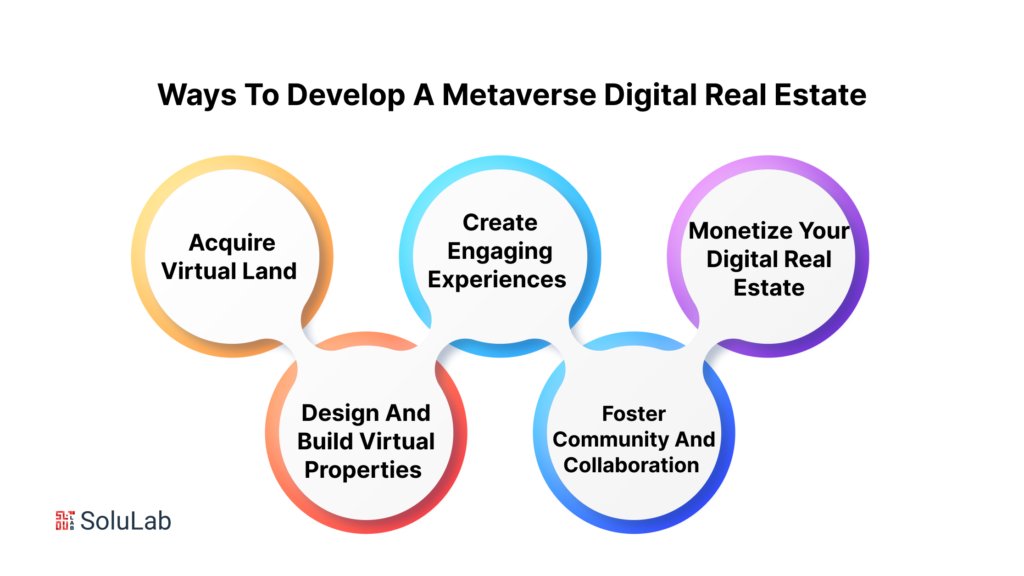
Usually, commercial names are the first to enter the metaverse. Millions of dollars in real estate in the metaverse have been poured into the metaverse.
Companies such as Republic Realm, which recently secured a $60 million fundraising round headed by Andreessen Horowitz and spun off a new real estate division, and Tokens.com are investing millions of dollars on plots of virtual property artificially limited in supply.
Ways to Develop A Metaverse Digital Real Estate
-
Acquire Virtual Land:
The first step in developing metaverse digital real estate is to acquire virtual land within a metaverse platform. Platforms like Decentraland, CryptoVoxels, and The Sandbox offer virtual land parcels that you can purchase using cryptocurrency. Research different platforms, evaluate their features and community, and choose a location that aligns with your investment goals and target audience.
-
Design and Build Virtual Properties:
Once you own virtual land, you can start designing and building virtual properties on it. This involves creating 3D models, textures, and interactive elements to bring your virtual real estate to life. Many metaverse platforms provide development tools and tutorials to assist you in creating immersive experiences for users. Consider engaging professional designers or developers if you lack the necessary skills or time.
Read Our Blog: Everything You Need to Know About Metaverse NFT Marketplace Development
-
Create Engaging Experiences:
To attract users to your metaverse real estate, focus on creating engaging experiences. Develop interactive games, virtual exhibitions, social hubs, or immersive environments that provide value and entertainment to users. Incorporate unique features, such as virtual art galleries, live events, or virtual commerce opportunities, to differentiate your digital real estate from others and enhance its appeal.
-
Foster Community and Collaboration:
Building a strong community is essential for the success of your metaverse digital real estate. Encourage user participation, host community events, and collaborate with other creators or businesses within the metaverse. By fostering a vibrant and engaged community, you can increase the visibility and desirability of your virtual properties, attracting more users and potential investors.
-
Monetize Your Digital Real Estate:
There are several ways to monetize your metaverse digital real estate. One option is to lease or sell virtual properties to other users who want to establish their presence within the metaverse. You can also generate revenue through virtual advertising, sponsorships, or in-world transactions. Explore partnerships with brands or businesses interested in promoting their products or services in the metaverse.
It’s important to stay updated with the evolving metaverse ecosystem and adapt your strategies accordingly. As technology advances and user preferences change, consider integrating new features, technologies, or functionalities to enhance the value and profitability of your metaverse digital real estate.
The Metaverse’s Real Estate Future
If you put money considerations aside, you may be wondering what firms and people will really do with their virtual estate.
To provide an example, the Metaverse Group’s acquisition is located in the fashion district of Decentraland. As stated by the buyer, the place will be utilized to organize digital fashion events and sell virtual apparel for avatars, which represents yet another potential development sector for the metaverse.
Although businesses and capitalists influence this market, not all metaverse digital real estate metaverse will cost you a fortune. But what exactly does buying virtual land may provide you with? When you purchase a physical property in the physical world, the outcome is visible – something to be proud of, a place to entertain friends and family, and a place to call home.
Regardless of the fact that virtual property does not provide any kind of physical shelter, there are some resemblances to real property. When looking for metaverse digital real estate, you may purchase a plot of land on which to construct a structure. Alternatively, you might pick a property you prefer that has already been constructed. One might complete it by including other (digital) things. One could host parties and invite people to the virtual house. One could also drop into the virtual homes of others.
Conclusion
In today’s rapidly evolving digital landscape, the metaverse has emerged as an exciting new frontier, offering endless possibilities for immersive experiences and interactions. One of the key areas of interest within the metaverse is digital real estate development. Building a metaverse digital real estate portfolio can be lucrative, allowing individuals and businesses to capitalize on the growing demand for virtual spaces.
Regarding metaverse development, SoluLab stands out as a trusted partner. With its expertise in metaverse technologies, SoluLab offers comprehensive solutions to help businesses create captivating virtual environments and digital properties within the metaverse. Their skilled team of developers can bring your vision to life, ensuring seamless integration, interactive features, and engaging user experiences.
Real estate tokenization is another area where SoluLab excels. By leveraging blockchain technology, they enable the tokenization of real-world assets, such as properties, transforming them into digital tokens that can be traded and owned within the metaverse. This innovative approach to real estate unlocks new opportunities for fractional ownership, increased liquidity, and global investment.
To support businesses in their metaverse endeavors, SoluLab also allows hiring dedicated metaverse developers. Their team of experienced professionals specializes in metaverse technologies, including virtual reality (VR), augmented reality (AR), and artificial intelligence (AI). By hiring skilled developers, businesses can ensure the successful implementation of their metaverse projects and leverage the full potential of this transformative digital landscape.
In conclusion, developing metaverse digital real estate opens up possibilities for individuals and businesses. SoluLab, with its expertise in metaverse development services, real estate tokenization, and a dedicated team of metaverse developers, is well-positioned to guide businesses through this exciting journey. By partnering with SoluLab, businesses can unlock the potential of the metaverse, create immersive virtual experiences, and stay ahead in the ever-evolving digital landscape.
FAQs
1. What is metaverse digital real estate?
Metaverse digital real estate refers to virtual properties and spaces within the metaverse, a collective virtual shared space. It allows users to interact with each other and engage in various activities. Metaverse digital real estate can range from virtual land, buildings, and venues to immersive experiences and virtual businesses.
2. How can I develop metaverse digital real estate?
You need to leverage metaverse development technologies and expertise to develop metaverse digital real estate. This includes creating virtual environments, designing interactive experiences, integrating immersive technologies like virtual reality (VR) and augmented reality (AR), and ensuring seamless connectivity within the metaverse. Partnering with a professional metaverse development company, like SoluLab, can provide the necessary skills and guidance to bring your metaverse digital real estate project to life.
3. What is real estate tokenization?
Real estate tokenization involves converting real-world assets, such as properties or buildings, into digital tokens on a blockchain. Tokenization enables fractional ownership, increased liquidity, and global accessibility. In the context of metaverse digital real estate, real estate tokenization allows virtual properties to be bought, sold, and traded within the metaverse, providing unique investment opportunities and expanding the scope of digital real estate ownership.
4. How can SoluLab help with metaverse development and real estate tokenization?
SoluLab offers various services to support businesses in metaverse development and real estate tokenization. Their team of experts specializes in metaverse technologies, including virtual reality, augmented reality, and blockchain. They can assist in creating captivating virtual environments, developing metaverse digital real estate projects, and implementing real estate tokenization strategies. Additionally, SoluLab provides dedicated metaverse developers for businesses who wish to hire professionals with the specific skill set required for successful metaverse projects.




